He has interacted with tens of thousands of young people since he was in his teens. And this 71-year-old educator has no plans of stopping.
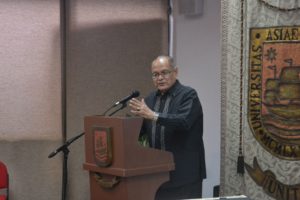
Dr. Antonio Jose N. Torralba started organizing conferences for and with young people when he was in high school, as president of the Student Catholic Action of the Archdiocese of Manila. At 18, he started teaching in Infanta, Quezon, where he met Vicky, his wife of 49 years (neither was from the province). He joined the Center for Research and Communication (CRC), the forerunner of UA&P, in 1972, and since then has become involved in the establishment of academic institutions and the development of programs that put education and the youth to the fore.
As holder of the Mariano and Estelita De Jesus Que Professorial Chair on Family and Youth Education, the retired UA&P Associate Professor continues to facilitate youth conferences and assemblies, with the help of students from UA&P and public schools and universities, and non-governmental organizations, such as Synergeia Foundation, Inc. and Campaign for Character Education Tenacity (CACHET). The seminars and other interventions focus on youth development and character education topics such as home and family life, studies and career, friendship and social responsibility, courtship and marriage, teenage lifestyle, human sexuality, and moral virtues.
Because he has been meeting young people from ages 12 to 19 for half a century now, we asked Doc T, as he is fondly called by students, his impressions on the youth of today and what others can do to help the young, who have been described as “in the midst of a mental health crisis.”
Universitas: You’ve been dealing with the youth for so many years now. How would you describe the young people today?
Doc T: There really is no difference between them and the young people in my time except perhaps for a change in behavior that is brought about by gadgets and social media. For example, because of electronic devices, there is anonymity; there is no face-to-face contact. Young people can easily bash another person without anyone knowing their true identity. If gadgets had not been discovered, everything that the kids are doing now would have been similar to what we were doing before. They were being done even during the time of Socrates and Plato. In my presentations, I ask “Who said this: ‘The young of today are (describing the “hopelessly crazy” young of today)’?” Several answers are given, all from the here and now world. But the answers are Socrates, and Plato, and other ancient and classical authors. The lesson: Times change, but human nature does not. The same with kids. Kids can still talk a lot, and listen a lot, and think a lot, and will a lot, and be noble a lot.
Universitas: What seems to be their most pressing concerns?
Doc T: Family life, for one. There’s the increasing trend of living in and the frequent quarreling of parents leading to virtual separation,
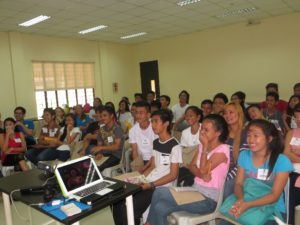
painfully protracted annulment, or virtual divorce. Then there is lack or total absence of communication between parents and children. I, for one, would never use the term “broken home,” thanks to a young person who studied here in UA&P, Jessica Gallegos. She said there is no such thing as a broken home. She heard the term “broken home” only when she became a facilitator of I AM S.T.R.O.N.G.[1] To her, “home” is where the heart is, where there is love, regardless of the absence of father or mother or even both. The challenges of “brokenness” can be overcome by household members who know how to really care for one another, down to the details of care and affection.
A second major concern is the young living in a sexualized world. Pre-marital sex, sexual intimacies, on-line dating, casual sex, LGBT and all the other 300 genders, pornography in sight and sound, and live-in arrangements are becoming a trend and lifestyle.
Of course, there is what to me is the exaggerated attention and focus on mental health and depression, which seems to make many young people put themselves in the mold described by “experts”: depressed, anxious, addicted to many things, irresponsible. One no-longer-deemed-shocking result is self-harm (slashing, one of its common forms), certainly not to commit suicide in many instances, but to externalize emotional pain. Over the decades, there seems to be stronger stress on the young being too weak to say “no” to sex outside of marriage, to abstain and be faithful, to manage the challenges of life… instead of helping them to be resilient, strong, empowered, without preaching but with the naturalness of friendship and personal concern.
Universitas: How about their aspirations? Their goals?
Doc T: I have always wished I had dealt more with students who were challenged in many ways, but right now I deal more with people who are more responsible, the student leaders. These are people belonging to the higher section. But, as in our time, many of these people are not sure of their aspirations. We were not sure of our aspirations when we were young. And I don’t think that has changed. As in the past, individual differences are mainly due to individual temperaments, personalities, and strength of character, rather than generational traits. Aspirations also vary from person to person, I guess, because of the positive (or negative) influence of parents, friends, and teachers. Generations X, Y, Z seem to play a less forceful role.
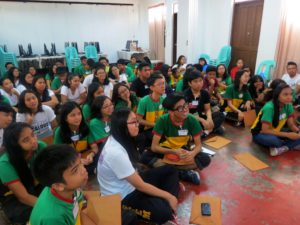
Universitas: So if you were asked by a parent for a piece of advice about how to deal with the young today, what would you tell them?
Doc T: Talk with them. Waste time with them. Give your whole heart in your conversations with your children. Heart is a natural gift of parents, but many seem to be wasting this gift. Spend time with them, even just listening, with silence of lips and minds. I think kids open up to me not because of my authority or what I seem to know, but because of my disposition to waste time in their company. From ‘la lang moments of conversation with kids come many revelations that they would not even open up to friends about.
Never ask rhetorical questions; ask real questions. Never compare, not even yourself with them. Tell the young not to compare themselves with anybody, but to be happy with who they are: unique from everyone else. When you talk to them, talk to them in order to understand, not in order to rebut their thoughts. Many parents and many educators talk to kids na habang kinakausap sila, ‘yung isip nila nasa kung ano na ang isasagot nila. Siguro mas maganda na wala kang iniisip. Na ‘yung labi mo ay silent at ‘yung mind mo, silent din. Na wala kang binubuong judgment at all.
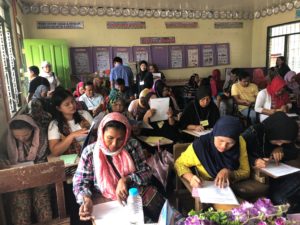
Universitas: What can you advise the educators?
Doc T: There are teachers who give their heart to their students, and they’re the ones remembered by the students. Good teachers are admired, but teachers with a heart are loved. So, put your heart into the things that you do.
Our University prides itself in having a strong corporate culture, expressed succinctly in its Credo. I am not sure though how we have helped our students imbibe our so-called corporate culture and Christian identity. This may sound corny, but there are teachers who transmit our culture by how they are and by what they do. Some others talk of elements of culture in an abstract “too Catholic” way, with little compassion or capacity to go into the minds and hearts of the students and bring them to the level that God has gifted them with.
Universitas: What’s the most interesting part in dealing with young people?
Doc T: The personal dealings. I prefer that somebody else gives the talk in seminars, and I be the one to entertain the students so that they feel comfortable with the speakers. And the games! Especially for public school kids, the time for games is the time that could make them smile and laugh – things which perhaps some of them do not get to do at home because of the seriousness and eerily quiet solemnity of the atmosphere there. But really, more than any other means, it is personal conversations that matter most, either me with two, three, or one person, whether boy or girl.
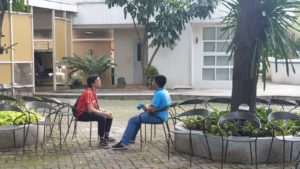
Universitas: Even the female students approach you and open up to you?
Doc T: Yes, very much so. One of the people I have great respect for said that no matter what anybody says to me, I should not stop the person from talking. I should listen…then talk. Listen…then talk. It helps make the other open up in complete freedom, with naturalness and spontaneity.
Universitas: Sometimes, you just listen.
Doc T: Yes, just listen. And respond. No matter how sensitive the thing might be. I love to do research, but prefacing the survey instrument administration with games, and a short spiel on personal excellence “on the ground…down to earth.” Invariably, everyone answers the instrument quite seriously and candidly, even personal and delicate questions. Then, I strike friendly conversations with groups or all the respondents. And many eventually become my phone friends.
Universitas: They like answering surveys?
Doc T: They like that. They like answering questions in survey instruments because they like to express their thoughts. Incidentally, one of the differences between the youth today and those in the past is that the young today seem to be more open because they’re also open in social media. May nagtatanong na “Sir, ilalagay ko ba dito na nagda-drugs ako?” I would say, “Yeah, okay. Bahala ka. Pero ako lang ang makakabasa n’yan.” Many intimate questions follow.
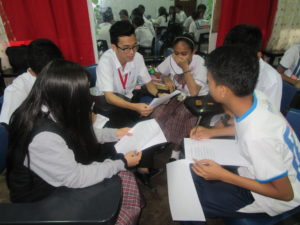
One thing here in the University that perhaps has to be addressed is that napakalakas ng affinity ng mga bata with the peer mentors but not so much with the adult mentors. The parents observe that. During parents’ colloquiums, parents invariably point out that their children appreciate peer mentoring more than teacher mentoring. And students like peer mentors because, of course, the peer mentors can relate better with them. And the peer mentors do not judge them. They don’t feel obliged at all to give comments or judgments on things, although one could say “Pare, ang sama mo naman” na padaplis, pabiro.
Universitas: What can you advise the readers regarding the youth’s concerns?
Doc T: Well, most of the students of UA&P belong to the upper class. Ang laki ng magagawa nila to help one another, especially those who are mentioned in our Credo, those “who are in most need in society.” The public school children, for example. But friendship with people whom they can help is the most important. I never did appreciate the terms extension, social outreach, social responsibility, and volunteerism that would appear in accreditation papers. They seemed to me rather condescending. Working with the young, or with anyone else, is a work of friendship. Mentors are friends more than they are mentors. Dealing with young people in seminars or even congresses is a work of friendship for me, not work, not duty, not extension. That’s perhaps why I have never felt that I was working in all my professional years. I have always loved what I was doing because it was a “leisure” (not work) of love, pardon the play of words.
Help even those who are here in UA&P. Rest assured that many do need help via genuinely listening ears for challenges, pains, problems regarding family, friends, relationships, self-concept, academics. You will perhaps meet them in the elevator, or the cafeteria, or on your way out of Stella Orientis. Ask them, “Where did you finish high school?” And this innocent question could lead to hours and days and years of friendship. It has always worked for me. And why high school? It seems to me the gateway of a journey of life, love, and everything in between.

Universitas: What do you want to accomplish after all is said and done?
Doc T: Well, to continue doing what I’m so happy doing, and strive (against all odds of human pride) to live true humility, realizing that my influence on the young is not due to me but to how THEY see and hear me. It is not a matter of me talking or doing things. It is how they see me doing or hear me saying things. This distinction, I feel, is needed for me to live humility.
There is this girl named Ishi. She can talk about pre-marital sex or pornography. She can talk about human sexuality—the morals of it—and many other moral issues without mentioning the Bible, without mentioning any of the papal documents, etc. “Sa’n mo nakukuha ‘yan?” I asked. Hindi sa school, I ventured. And she added, not from her parents directly, since she had not heard her parents talk about them. Kasi nakikita n’ya. Nakikita n’ya ‘yung parents n’ya na isinasabuhay ‘yung mga nasasabi n’ya.
One of the most pleasant experiences I had working with young people would be, as an illustration, hearing from someone who’s now the head of Nursing at the University of Michigan. He attended an I AM S.T.R.O.N.G. seminar in 1998. He recently wrote via email that many of his decisions in life have been based on that two-day seminar that he attended, not on what was said and what was done, but on what HE HEARD and HE SAW done.
Then there was an eloquent girl from Muntinlupa Science High School. During a seminar, she would argue for pre-marital sex. She would defend gays being gays—not the respect for gays, but the gay lifestyle kung talagang ‘yun ang gusto. In I AM S.T.R.O.N.G., there is an activity, “Agree – Disagree,” and the kids are allowed to give their views, and these views are processed. At the end of that day, she wrote a blog that said “This day changed my life.”#
[1] I AM S.T.R.O.N.G. – I KEEP LOVE REAL is a UA&P program established in 1998 intended to help young people make responsible day-to-day decisions in key aspects of their life.
Banner photo by Roberto Nickson on Unsplash.
Leave a Reply